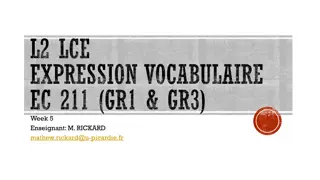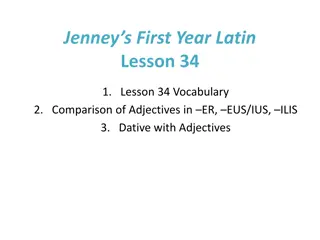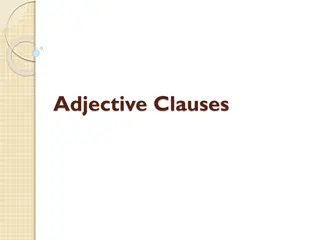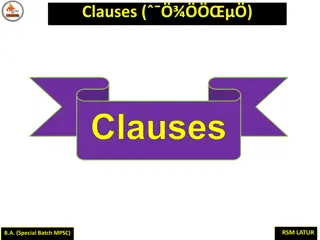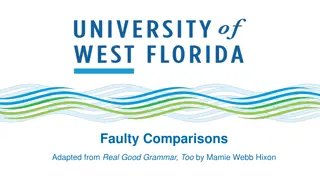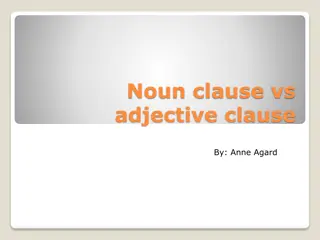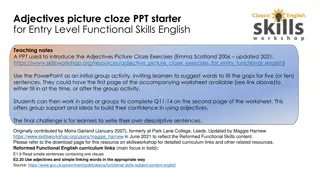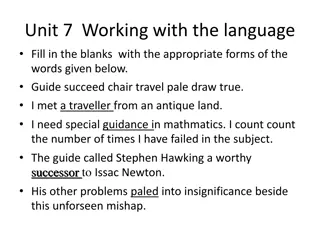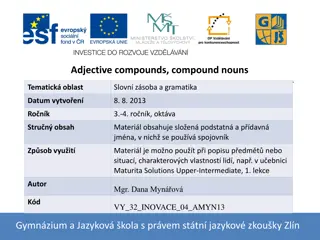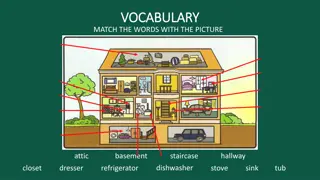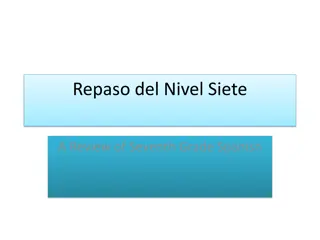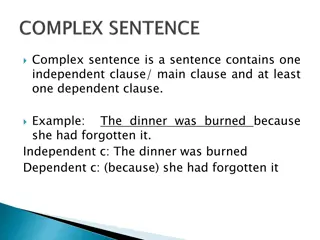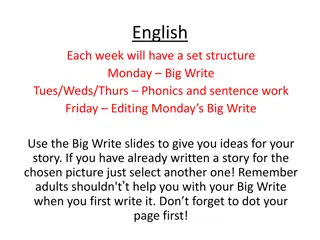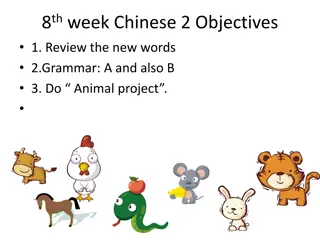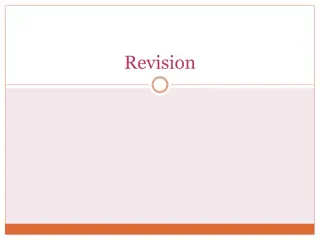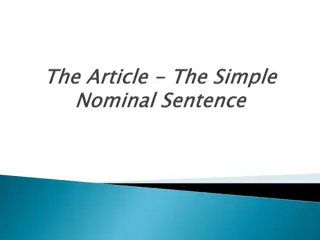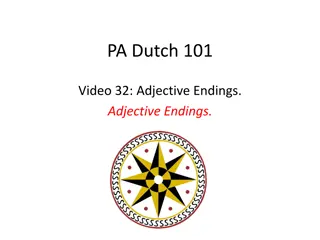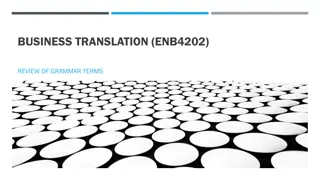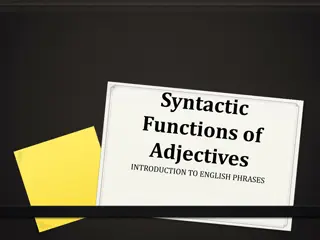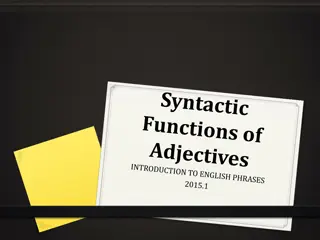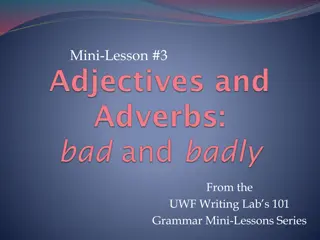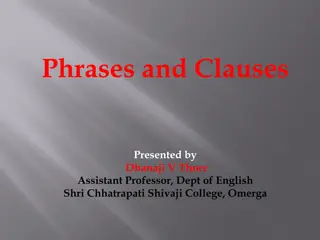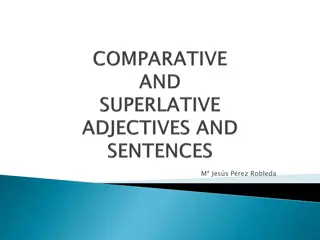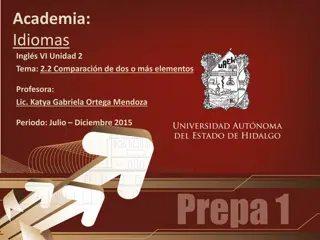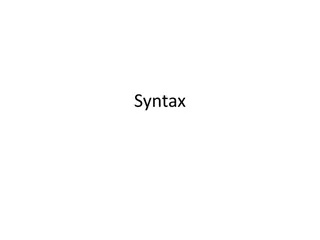DERIVATIONAL MORPHOLOGY. PREFIXATION.
Derivational morphology in the English language involves forming new words by adding affixes to a base, resulting in derivatives or derived words. Prefixation is a productive process, especially for verb and adjective formation. Prefixes can be classified based on their meanings, such as negative, p
6 views • 6 slides
Understanding Adjective Usage in English Language
Exploring the effective use of adjectives in English language, this content covers the positioning, punctuation, and order of adjectives. It explains the difference between predicative and attributive adjectives and provides examples to clarify their usage. Additionally, it discusses the importance
1 views • 22 slides
Latin Lesson 34 Vocabulary: Adjective Comparisons and Dative Constructions
Learn about adjectives in ER, EUS/IUS, ILIS forms, and how they are used in comparisons. Explore dative constructions with adjectives and enhance your Latin vocabulary with words like "aureus" (golden), "dexter" (right), "difficilis" (difficult), and more.
1 views • 32 slides
Understanding Adjective Clauses in English Grammar
Adjective clauses, also known as relative clauses, are dependent clauses that act as adjectives in sentences. They modify nouns, pronouns, or entire sentences and begin with a relative pronoun. This article explains how adjective clauses function, provides examples, and discusses the use of pronouns
1 views • 62 slides
Understanding Noun Clauses and Their Functions
A clause is a group of words containing a subject and predicate forming part of a sentence. Noun clauses act as nouns in a sentence and can function in various ways, such as being the subject or object of a verb, participle, or preposition. They are identified by asking "who" or "what" questions and
0 views • 23 slides
Understanding Adjective Agreement in French Grammar
Adjectives in French must agree with the nouns they describe in terms of gender and number. They can either come before or after the noun, and their position can change the meaning. Learning these rules is essential for effective language use.
2 views • 17 slides
Understanding Clauses and Their Types in English Grammar
This comprehensive guide explores different types of clauses in English grammar, including main clauses, subordinate clauses, independent clauses, adverb clauses, noun clauses, and adjective clauses. It delves into the functions of clauses as subjects, objects, complements of verbs, objects of prepo
2 views • 11 slides
Understanding Complements in Grammar
The word "complement" originates from Latin meaning to fill up or complete and is essential in completing the meaning of a verb. Complements can be a noun, pronoun, or adjective but never an adverb. They are never found in a prepositional phrase. Learn about direct objects, indirect objects, and pre
0 views • 15 slides
Correct Usage of Adjective and Adverb Comparisons
Learn how to correctly compare adjectives and adverbs using the positive, comparative, and superlative forms. Avoid common mistakes like double comparisons and ensure you use the right form based on the number of items being compared. Improve your grammar skills with clear examples and revisions for
0 views • 14 slides
Learn English Comparatives and Superlatives: Forms and Examples
Explore the various forms and examples of comparatives and superlatives in English language usage. From using "as...as" for similarity to "more/less...than" for comparison, and ending with "the most/least...adjective" for superlatives, this guide provides clear examples and images to help you unders
2 views • 12 slides
Understanding Adjective Clauses and Noun Clauses in English Grammar
Learn the key differences between adjective clauses and noun clauses in English grammar. Adjective clauses describe nouns, while noun clauses take the place of a noun in a sentence, serving as either the subject or object of a verb. Discover how to identify and use these clauses effectively through
0 views • 10 slides
Fun Adjectives Picture Cloze Activities for English Learners
Engage English learners in interactive adjective practice with a PowerPoint starter introducing Adjectives Picture Cloze Exercises. This resource includes group activities, worksheets, and challenges to build confidence in using adjectives effectively. Developed for Entry Level Functional Skills Eng
0 views • 4 slides
Enhancing Language Skills in Unit 7 Activities
Enhance your language skills with engaging activities focusing on vocabulary building, sentence completion, word combinations, adjective forms, notice writing format, and creating meaningful phrases. Dive into the world of language and master your communication abilities through practical exercises
0 views • 8 slides
Learn Adjective Compounds and Compound Nouns
Improve your understanding of adjective compounds and compound nouns through matching exercises and translations. Practice using two-word adjectives and answer questions related to personal experiences. Utilize provided resources for further learning.
0 views • 6 slides
Vocabulary and Grammar Exercises for Home and Everyday Life
Enhance your English skills with vocabulary matching, adjective comparison, plural forms, present simple and continuous exercises, irregular verbs practice, and future form questions related to home and daily activities. Improve your language proficiency through engaging activities and examples.
0 views • 8 slides
Review of Seventh Grade Spanish Lessons - Nivel Siete
Review the lessons of Spanish 7 including descriptive vocabulary, adjectives, and the verb 'ser'. Practice with ser and adjective agreement activities to prepare for the upcoming test on verb ser and adjective agreement. Unscramble feelings and emotions vocabulary, match English adjectives with thei
0 views • 20 slides
Learning Descriptive Adjectives: Forms, Agreement, and Position
This lesson covers the forms, agreement, and position of descriptive adjectives, including regular and irregular adjectives. You will learn about the pronunciation of adjectives and their usage with examples. Understanding the agreement of adjectives with nouns in gender and number is essential. Pra
0 views • 6 slides
Understanding Complex Sentences and Clauses
Complex sentences consist of an independent clause and at least one dependent clause, such as adjective, adverb, or noun clauses. They are connected using subordinate conjunctions, relative pronouns, and relative adverbs. Each has a specific role in modifying nouns, pronouns, verbs, adverbs, or conn
0 views • 14 slides
Understanding Adjectives and Adverbs Usage: Common Errors and Differences
Adjectives modify nouns and pronouns, while adverbs modify verbs, adjectives, and other adverbs. Learn the differences, common errors, and how to distinguish between commonly confused adjective/adverb pairs like real/really and sure/surely. Enhance your understanding of when to use each correctly.
0 views • 7 slides
Weekly English Learning Structure with Writing Challenges
Engage in a structured English learning routine each week with specific activities for each day. Dive into Big Write sessions, phonics, sentence work, and editing tasks to enhance your writing skills. Explore various challenges like word associations, adjective usage, prefix exercises, and story wri
0 views • 21 slides
Weekly Chinese Learning Objectives and Projects
Explore new words, practice grammar concepts, and engage in animal projects in this week's Chinese class. Review, practice, and create descriptions of animals while learning vocabulary related to different habitats like grasslands, mountains, rivers, oceans, and deserts. Participate in quizzes, desc
0 views • 13 slides
Learning About Emotions in French
Explore how to express feelings in French, distinguish between masculine and feminine adjectives, identify cognates, and understand the difference in adjective forms based on gender. Practice asking and answering "How are you feeling today?" while learning new vocabulary and pronunciation. Improve y
0 views • 37 slides
Latin Noun Declensions and Adjective Agreement Study Guide
Explore the intricacies of Latin 3rd declension nouns, genitive endings, and adjective agreement with this comprehensive study guide. Learn to differentiate between paradigms, identify stem variations, and make declension decisions based on gender and form. Practice forming genitives, plurals, and p
0 views • 21 slides
Understanding Arabic Grammar and Language Structure
In Arabic, there is no indefinite article, and the presence of nunation indicates indefiniteness. Adjectives come after nouns they qualify, and the adjective agrees with the noun in gender, number, and definiteness. The definite article "al" changes based on certain rules. Personal pronouns in Arabi
0 views • 13 slides
Spanish 1: Learning Adjectives and Colors
In this Spanish 1 course, students will learn about adjectives and colors to describe nouns in both gender and number forms. The lessons cover the identification of colors, recognizing the correct position, gender, and number of adjectives, as well as identifying objects based on spoken descriptions
0 views • 16 slides
Understanding Verbs: Types and Usage
Verbs are essential in forming statements and expressing action or states of being. They can show time through different tenses such as past, present, and future. Action verbs depict physical or mental actions, while linking verbs connect the subject with a noun, pronoun, or adjective. Verb phrases
0 views • 8 slides
Understanding Adjective Endings in Pennsylvania Dutch (PA Dutch 101)
Adjectives in Pennsylvania Dutch are used to describe nouns, similar to English. Depending on the situation, adjectives either follow special endings or do not take an ending. Three main situations affect adjective endings when used with definite articles, indefinite articles, or independently. Addi
0 views • 14 slides
Understanding Grammar Terms in Business Translation (ENB4202)
Explore key grammar terms such as action verb, adjective, adverb, article, clause, coordinating conjunction, dependent clause, gerund, linking verb, noun, noun phrase, object, phrase, preposition, pronoun, and subject in the context of business translation. Learn their definitions, functions, and ex
0 views • 14 slides
Understanding Different Types of Adjective Functions in English Grammar
Learn about attributive adjectives that modify nouns, predicative adjectives used with linking verbs, post-modifiers like reduced clauses, adjectives acting as the head of a noun phrase, verbless adjective clauses, and exclamatory adjective sentences in English grammar.
0 views • 7 slides
Understanding Adjective Phrases in English Grammar
Learn about different types of adjective phrases in English grammar, including attributive, predicative, post-modifier, head of a noun phrase, verbless adjective clause, and exclamatory adjective sentences. Explore examples and functions of each type to enhance your understanding of how adjectives a
0 views • 7 slides
Understanding the Difference Between "Bad" and "Badly
Learn the distinction between "bad" and "badly" in grammar. "Bad" is used as an adjective after sense or linking verbs, while "badly" is an adverb used after all other verbs. Examples and test sentences included to enhance understanding of correct usage.
0 views • 5 slides
Understanding Adjective Phrases in English Grammar
Learn about adjective phrases in English grammar through examples and explanations. Explore how these phrases describe nouns or pronouns, answer questions like "What kind?" or "How many?", and usually follow the words they describe. Enhance your understanding with practice exercises and tips for ide
0 views • 27 slides
Understanding Phrases and Clauses in English Grammar
This content dives into the concepts of phrases and clauses in English grammar, presented by Assistant Professor Dhanaji V. Thore. It explains how a phrase is a group of related words lacking a subject and predicate, while a clause contains both a subject and a predicate to form a complete sentence.
0 views • 23 slides
Understanding English Phrase Structure: Analysis and Examples
Explore the morphosyntactic analysis of English phrases and the grammatical hierarchy, delving into sentence constituents, clauses, phrases, words, and morphemes. Learn about different types of phrases, their structures, and elements like modifiers, headwords, and grammatical markers, with illustrat
0 views • 30 slides
Enhancing Vocabulary with Adjective Suffixes: A Comprehensive Guide
Explore the world of adjective suffixes such as -ful, -less, -able, -ical, and more through visually engaging content. Learn how to form adjectives by adding these suffixes to base words, expanding your vocabulary and descriptive abilities. Discover examples of words like beautiful, forgetful, and c
0 views • 22 slides
Grammar on the Go! Unit 5 Lesson 7 Sentence Corrections & Clauses
This content focuses on sentence corrections in red, defining vocabulary words, and understanding different types of sentences such as compound, complex, simple, and compound/complex. It also covers identifying sentence types like declarative, imperative, interrogative, and exclamatory. Additionally
0 views • 9 slides
Understanding Adjective Comparison in English Grammar
Explore the rules for forming comparative and superlative forms of adjectives in English grammar. Learn about irregular comparisons, one-syllable adjectives, adjectives ending in -y, -ow, -le, -er, multi-syllable adjectives, hyphenated adjectives, and more. Discover the nuances of adjectives with on
0 views • 14 slides
Mastering Adjective Comparisons in English Language Learning
In the English language, understanding how to use comparative and superlative forms of adjectives is crucial for effectively comparing different characteristics of people, things, animals, or places. By employing specific spelling rules and dividing adjectives into short and long categories, learner
0 views • 13 slides
Understanding Syntax in Linguistics
Words in a language are organized into phrases and clauses with specific syntactic categories like Noun Phrase, Verb Phrase, and Adjective Phrase. Each phrase has a head such as a noun, verb, or adjective, and phrase structure rules help diagram the syntactic structure. Clauses are the largest units
0 views • 20 slides
Understanding Relative Pronouns and Adjective Clauses in Literature
Explore the use of relative pronouns and adjective clauses in literary works by authors like Gary D. Schmidt and Jim Murphy. Learn the distinctions between "who," "whose," "whom," and "that" in referring to people and things. Practice identifying and creating examples of adjective clauses starting w
0 views • 10 slides

